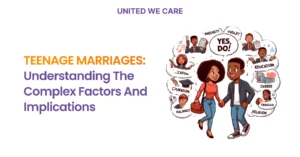Introduction
Teenage pregnancy denotes pregnancy in adolescent girls. Generally, the age of girls who are teenage mothers is below 2O years. Studies suggest that the highest rates of adolescent pregnancy cases occur in developing countries. Teenage pregnancy can impact the health of the adolescent mother and the child as the child born from a young mother below age 20 can be at risk of premature birth, low birth weight, and other dangers.
What Is Teenage Pregnancy?
Teenage pregnancy is when the mother who conceives a child is below the age of 20. Adolescent pregnancy is a worldwide issue affecting the health of both the mother and the child. A girl going to give birth to a child before her twenties has to deal with challenges like Impact on health, education, and social well-being.
According to a study in the united states, approximately 181,000 children were born to teenage mothers in the last decade. The data found in the study highlights the fact that need for prevention and strategies for intervention to address teenage pregnancy is necessary.
Causes of Teenage Pregnancy
Teen pregnancy is a complex issue that is influenced by various factors.

-
Inadequate Sex Education: Discussing about sex or related topics with children is still considered taboo, and most parents and teachers still avoid talking about such topics with their children. Most teenagers don’t know about safe sex practices and how to prevent pregnancy. Some teenage affair is also a cause. Get more information of teenage affair from this article.
- Contraception Inaccessibility: Many factors play a role, as financial barriers or the requirement of parental consent in some places can result in the inaccessibility of contraceptive methods.
- Poverty: Poverty can be another factor, as studies found that teen pregnancy is more common in low-income communities where healthcare and education are not very easily accessible.
- Peer Pressure and Social Norms: Peer pressure amongst teens can be a reason why individuals engage in sexual activity to fit in or to be famous amongst their friends. Social norms also glorify early sexual activity.
- Substance Abuse and Risky Behaviours: Teens are at higher risk of engaging in risk-taking behavior like engaging in substance abuse or unprotected sexual activity.
Lack of accessibility to contraception, low-income society, peer pressure, and inadequate sex education are the causes of teenage pregnancy.
Challenges and Complications of Teenage Pregnancy
If a teen gets pregnant, this situation is quite complicated for the well-being of the pregnant teen and her child. It includes many physical and mental health problems like low birth weight, premature birth, extreme labor pain, blood pressure, anemia, social discrimination, and economic problems.
Few of the risks involved with teenage pregnancy are as follows:
- Maternal health risks:Teenage mothers and their children are more vulnerable to maternal health risks during pregnancy or childbirth. Premature labor pain, high blood pressure, anemia, and postpartum depression are a few of the maternal health risks.
- Risks for the developing fetus: The risk of giving birth to a baby with low birth weight, premature birth, or developmental delays in achieving developmental milestones increases if the mother is a teen. Children born to teenage mothers are at higher risk of having behavioral and emotional problems later in life.
- Long-term health consequences for the mother: Teen mothers may face long-term health consequences due to their pregnancy, such as a higher risk of obesity, diabetes, and heart disease.
Long-term health consequences for teen mothers are higher risk of gaining weight, diabetes and heart disease.
The Impact of Teenage Pregnancy
Teenage pregnancy can significantly impact a teen’s social and economic condition.
- Stigma and discrimination: Stigma and discrimination from their families and society can cause teen mothers to feel isolated, leading to depression and a lack of support.
- Educational and career challenges: Due to pregnancy at an early age, schooling or college education comes to a halt, making it difficult for them to continue their education.
- Economic hardship: Teen mothers struggle with money and other resources as they are not financially well. Stigma, discrimination, and limited career and educational opportunities make them hard to sustain.
It’s necessary to address the factors contributing to teenage pregnancy so that necessary steps can be taken to minimize its associated health, social and financial risks.

Strategies that can be helpful in the prevention and intervention of teenage pregnancy are as follows:
- Comprehensive Sex Education: Inclusion of sex education in the school curriculum so that the child has accurate information about sex-related topics and the associated risks.
- Access to Contraception: Access to contraception for teens not only can help to reduce teenage pregnancy but can help to manage the risk of sexually transmitted diseases.
- Support Services for Teen Parents: Teen parents may face many issues like social stigmatization, economic issues, and it’s difficult for a teen parent to take care of their child. It’s necessary to have some support system in society that can help provide resources to teen parents like education on parenting, healthcare services, and some program for them designed to help them financially.
- Addressing Social and Economic Disparities: Society has a crucial role to play in the prevention of teenage pregnancy. Instead of using discrimination toward teens who get pregnant, society can help them by providing better healthcare facilities and financial support.
Conclusion
Teenage pregnancy is a challenge that not only can risk danger to the life of the teen mother and child but also make it difficult for the mental health of the teen parent. To deal with the challenges of teenage pregnancy, its necessary to include sex education in the curriculum of schools, access to better healthcare facilities, and some ways to provide financial support to teen parents.
Read this article to know if you need teenage therapist.
You can visit united we care, a mental wellness platform, to learn more about mental health issues and book an appointment with an expert.
REFERENCES
[1]“Adolescent pregnancy,” Who. int. [Online]. Available: https://www.who.int/news-room/fact-sheets/detail/adolescent-pregnancy. [Accessed: 15-May-2023].
[2]“About teen pregnancy,” Cdc.gov, 15-Nov-2021. [Online]. Available: https://www.cdc.gov/teenpregnancy/about/index.htm. [Accessed: 15-May-2023].
[3] J. Schrader and K. J. Gruenke, “Teenage pregnancy,” Reprod. Toxicol., vol. 7, no. 5, pp. 525–526, 1993.









